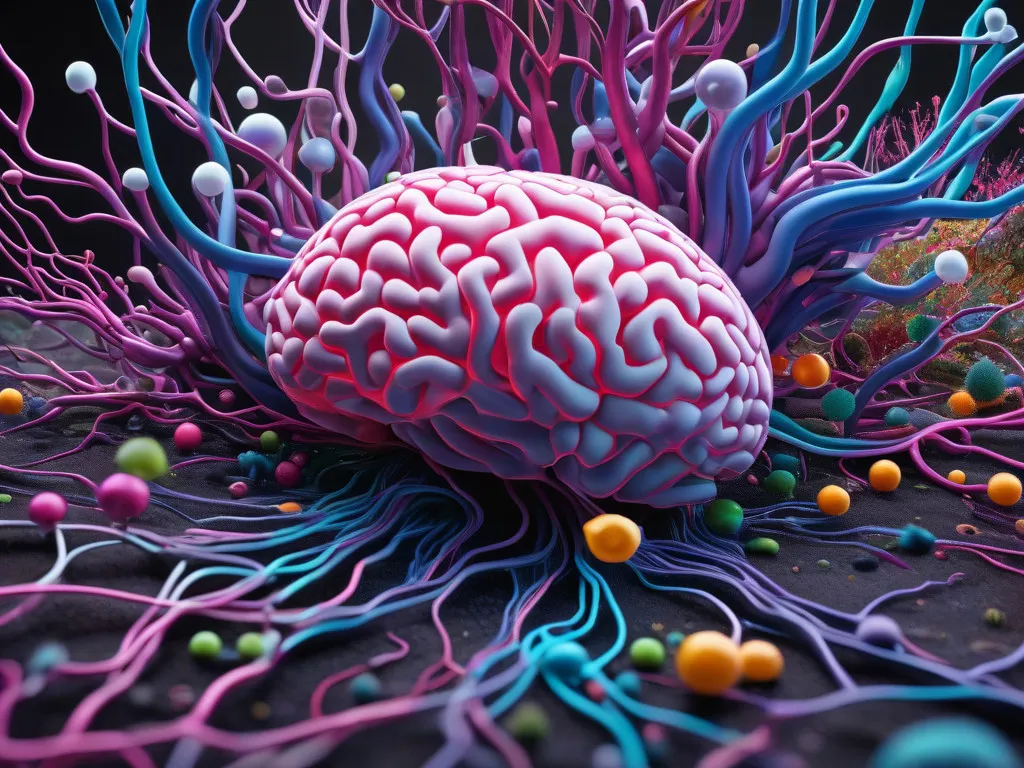How Does Gut Health Influence Brain Health And Cognitive Performance?

How Does Gut Health Influence Brain Health And Cognitive Performance?
Health experts have long emphasized the importance of maintaining a healthy gut for overall well-being, but it's direct link to brain health and cognitive performance is a relatively recent discovery. Research has shown that the gut-brain connection plays a crucial role in influencing various aspects of mental health and cognitive function.
Key Takeaways:
- Gut-Brain Connection: There is a strong connection between gut health and brain health, known as the gut-brain axis.
- Microbiota Influence: The gut microbiota can influence brain function and cognitive performance through the production of neurotransmitters and other signaling molecules.
- Inflammation Impact: Imbalances in gut bacteria can lead to inflammation, which may negatively impact brain health and cognitive function.
- Dietary Role: A healthy diet rich in fiber, prebiotics, and probiotics can support gut health, positively impacting brain function.
- Lifestyle Factors: Factors such as stress, sleep, and exercise can also influence gut health, which in turn affects brain health and cognitive performance.
The Science Behind the Gut-Brain Axis
Anatomical Links between the Gut and Brain
Any discussion about the gut-brain axis must acknowledge the anatomical links that connect these two crucial systems in our body. The primary connection is the vagus nerve, a long cranial nerve that runs from the brainstem to the abdomen, playing a pivotal role in bidirectional communication between the gut and the brain.
Neural Pathways and Their Influence on Health
Behind the scenes, a complex network of neural pathways operates to relay information between the gut and the brain, influencing various aspects of our health. These pathways not only facilitate the transmission of signals related to digestion and metabolism but also impact our immune system, mood, and cognitive function.
The intimate connection between the gut and brain means that disruptions in gut health can have a profound impact on overall well-being, including cognitive performance and mental health. Ensuring a healthy gut ecology through balanced nutrition, stress management, and probiotic support is crucial for maintaining optimal brain function and overall health.

The Role of Gut Microbiota in Brain Function
The Microbiome and Its Impact on Mental Health
One of the most fascinating aspects of gut health is its influence on mental well-being. Research has shown that the gut microbiota communicate with the brain through various pathways, impacting mood, behavior, and cognitive function. Factors such as diet, stress, antibiotics, and even birth delivery method can influence the composition of gut bacteria, which in turn can affect mental health.
Imbalances in the gut microbiome have been linked to conditions such as anxiety, depression, and even neurodegenerative diseases.
Probiotics, Prebiotics, and Cognitive Well-being
One exciting area of research is the use of probiotics and prebiotics to improve cognitive function and mental health. Probiotics are live bacteria that can benefit the gut microbiota, while prebiotics are specialized plant fibers that nourish the good bacteria in the gut. By incorporating these supplements into your diet, you can potentially support a healthy gut-brain axis and improve cognitive well-being.
Probiotics have been shown to have a positive impact on mood and stress levels, potentially reducing symptoms of depression and anxiety. By promoting the growth of beneficial bacteria in the gut, probiotics can help modulate inflammation and improve neurotransmitter function, which are crucial for mental health. Including prebiotic-rich foods such as onions, garlic, and bananas in your diet can also support the growth of good gut bacteria, further enhancing cognitive function and overall well-being.
Nutritional Influences on Cognitive Performance
Now, Probiotics may help boost mood and cognitive function in a significant way. Research suggests that the gut-brain axis plays a crucial role in influencing cognitive functions. By maintaining a healthy gut, you may also be supporting optimal brain health and cognitive performance.
Foods That Benefit the Gut-Brain Relationship
Influences on gut health, such as incorporating probiotic-rich foods like yogurt, kefir, sauerkraut, and kimchi, can help promote a healthy balance of gut bacteria.
Prebiotic foods like onions, garlic, bananas, and whole grains can also nourish the good bacteria in your gut. These foods contribute to a diverse microbiome, which has been linked to improved mood and cognitive function.
Dietary Patterns to Avoid for Optimal Brain Health
Foods that are high in sugar and processed ingredients can negatively impact the gut microbiome, leading to inflammation and cognitive decline. Highly processed foods, sugary snacks, and sweetened beverages are known to disrupt the gut-brain axis and may impair cognitive performance over time. It's imperative to limit these foods and focus on a nutrient-dense diet to support both gut and brain health.
For instance, a diet high in trans fats, saturated fats, and refined carbohydrates can contribute to gut dysbiosis, which in turn affects cognitive function. By avoiding these dietary patterns, you can prioritize foods that nourish your gut microbiome and support optimal brain function.

The Impact of Gut Health on Neurological Disorders
Gut Dysbiosis and Its Association with Neurodegeneration
Many studies have shown that the balance of bacteria in the gut, known as gut dysbiosis, can have a significant impact on neurological disorders such as Alzheimer's and Parkinson's disease. Health issues in the gut can lead to inflammation, which may contribute to the development and progression of these neurodegenerative diseases. The communication between the gut and the brain, known as the gut-brain axis, plays a crucial role in maintaining brain health.
The Connection between the Gut and Mood Disorders
To understand the connection between gut health and mood disorders like depression and anxiety, it's crucial to recognize the influence of the gut microbiome on the production of neurotransmitters such as serotonin. Serotonin is a key neurotransmitter that regulates mood, and a large portion of it is produced in the gut. Imbalances in the gut microbiome can impact serotonin production, leading to disruptions in mood and cognitive function.
A balanced gut microbiome can have a positive impact on mental health, while an unhealthy gut can worsen symptoms of mood disorders. It's crucial to prioritize gut health through a nutritious diet, probiotics, and other lifestyle factors to support overall well-being.
Strategies to Enhance Gut and Brain Health
Lifestyle Modifications for Better Gut-Brain Dynamics
For optimal gut-brain dynamics, making lifestyle modifications can play a key role. An imperative aspect is incorporating a balanced diet rich in fiber, prebiotics, and probiotics. These components are crucial for maintaining a healthy gut microbiome, which in turn influences brain function. Additionally, regular exercise has been shown to support both gut health and cognitive performance. Managing stress through techniques such as mindfulness meditation or yoga can also positively impact the gut-brain axis.
Supplements and Their Role in Cognitive Function
An important consideration for enhancing cognitive function is the role of supplements in gut and brain health. Probiotics and omega-3 fatty acids are commonly used supplements known for their beneficial effects on both the gut microbiome and brain function. These supplements can help reduce inflammation in the body and support the production of neurotransmitters imperative for cognitive processes.
Lifestyle habits and dietary choices play a significant role in maintaining gut and brain health. By incorporating a variety of nutrient-dense foods, staying physically active, and managing stress effectively, individuals can support their overall well-being. Additionally, targeted supplements can provide added support for cognitive function, contributing to improved brain health.
Monitoring and Measuring Cognitive Health
Despite the complex relationship between gut health and cognitive performance, there are ways to monitor and measure cognitive health to understand how it is influenced by the gut. By using various tools and tests, we can gain valuable insights into how the two are connected and how improvements in gut health can lead to better cognitive function.
Tools and Tests for Cognitive Performance
With advancements in technology, there are now a variety of tools and tests available to assess cognitive performance. These include cognitive assessment batteries, brain imaging techniques like fMRI, EEG, and computerized cognitive tasks. These tools help professionals measure various cognitive domains such as memory, attention, executive function, and processing speed, providing a comprehensive overview of an individual's cognitive health.
Tracking Improvements Linked to Gut Health Adjustments
Tests have shown that improvements in gut health can lead to significant enhancements in cognitive performance. By making adjustments to one's diet, such as incorporating more probiotic-rich foods and reducing the intake of processed foods and sugars, individuals may experience improvements in memory, focus, and overall cognitive function. These changes can be tracked and measured through cognitive assessments and brain imaging, providing concrete evidence of the impact of gut health on the brain.
Another important aspect to consider when tracking improvements linked to gut health adjustments is the role of lifestyle factors such as exercise, stress management, and sleep. These factors also play a crucial role in maintaining a healthy gut-brain connection and should be taken into account when making changes to improve cognitive health.

Final Words
So, it is clear that there is a strong connection between gut health and brain health, with the gut often being referred to as the “second brain.” Maintaining a healthy gut through a balanced diet, regular exercise, and stress management can have a positive impact on cognitive performance and overall brain function.
By understanding the relationship between gut health and brain health, we can make more informed choices when it comes to our lifestyle and diet. Taking care of your gut through probiotics, prebiotics, and fiber-rich foods can lead to improved cognitive performance and a happier, healthier brain.
FAQ
Q: Why is gut health important for brain health and cognitive performance?
A: Gut health is important for brain health and cognitive performance because the gut and brain are connected through the gut-brain axis. The gut is home to trillions of bacteria that play a crucial role in producing neurotransmitters and regulating inflammation, both of which can impact brain function.
Q: How does an unhealthy gut affect cognitive performance?
A: An unhealthy gut can lead to inflammation, which has been linked to cognitive decline and conditions such as Alzheimer's disease. It can also disrupt the production of neurotransmitters like serotonin and dopamine, which are important for mood and cognition.
Q: What are some signs of poor gut health that may be affecting brain function?
A: Some signs of poor gut health that may be affecting brain function include digestive issues like bloating and constipation, mood disorders like anxiety and depression, and cognitive symptoms like brain fog and difficulty concentrating.
Q: How can I improve my gut health to support brain health and cognitive performance?
A: You can improve your gut health by eating a diet rich in fiber and fermented foods, taking probiotics, managing stress, getting regular exercise, and staying hydrated. These habits can help promote a healthy gut microbiome, which in turn can benefit your brain health.
Q: Are there any specific foods or supplements that are particularly beneficial for gut-brain health?
A: Foods like yogurt, kefir, sauerkraut, and kimchi are rich in probiotics that can support gut health. Additionally, foods high in fiber, like fruits, vegetables, and whole grains, can help nourish beneficial gut bacteria. Supplements like omega-3 fatty acids and curcumin may also provide benefits for both gut and brain health.
